v ed作定语和表语
- 格式:ppt
- 大小:843.50 KB
- 文档页数:18
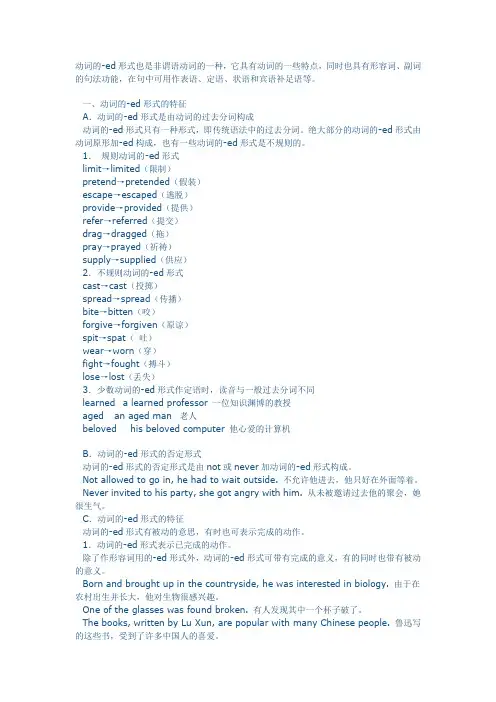
动词的-ed形式也是非谓语动词的一种,它具有动词的一些特点,同时也具有形容词、副词的句法功能,在句中可用作表语、定语、状语和宾语补足语等。
一、动词的-ed形式的特征A.动词的-ed形式是由动词的过去分词构成动词的-ed形式只有一种形式,即传统语法中的过去分词。
绝大部分的动词的-ed形式由动词原形加-ed构成,也有一些动词的-ed形式是不规则的。
1.规则动词的-ed形式limit→limited(限制)pretend→pretended(假装)escape→escaped(逃脱)provide→provided(提供)refer→referred(提交)drag→dragged(拖)pray→prayed(祈祷)supply→supplied(供应)2.不规则动词的-ed形式cast→cast(投掷)spread→spread(传播)bite→bitten(咬)forgive→forgiven(原谅)spit→spat(吐)wear→worn(穿)fight→fought(搏斗)lose→lost(丢失)3.少数动词的-ed形式作定语时,读音与一般过去分词不同learned a learned professor 一位知识渊博的教授aged an aged man 老人beloved his beloved computer 他心爱的计算机B.动词的-ed形式的否定形式动词的-ed形式的否定形式是由not或never加动词的-ed形式构成。
Not allowed to go in, he had to wait outside. 不允许他进去,他只好在外面等着。
Never invited to his party, she got angry with him. 从未被邀请过去他的聚会,她很生气。
C.动词的-ed形式的特征动词的-ed形式有被动的意思,有时也可表示完成的动作。
1.动词的-ed形式表示已完成的动作。
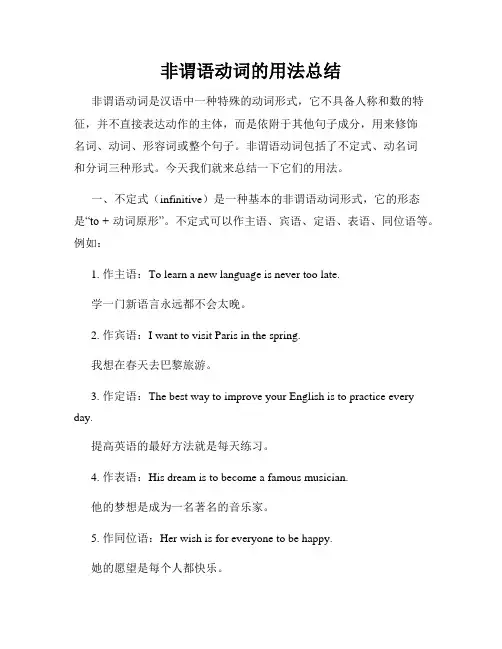
非谓语动词的用法总结非谓语动词是汉语中一种特殊的动词形式,它不具备人称和数的特征,并不直接表达动作的主体,而是依附于其他句子成分,用来修饰名词、动词、形容词或整个句子。
非谓语动词包括了不定式、动名词和分词三种形式。
今天我们就来总结一下它们的用法。
一、不定式(infinitive)是一种基本的非谓语动词形式,它的形态是“to + 动词原形”。
不定式可以作主语、宾语、定语、表语、同位语等。
例如:1. 作主语:To learn a new language is never too late.学一门新语言永远都不会太晚。
2. 作宾语:I want to visit Paris in the spring.我想在春天去巴黎旅游。
3. 作定语:The best way to improve your English is to practice every day.提高英语的最好方法就是每天练习。
4. 作表语:His dream is to become a famous musician.他的梦想是成为一名著名的音乐家。
5. 作同位语:Her wish is for everyone to be happy.她的愿望是每个人都快乐。
二、动名词(gerund)是名词化的动词,它的形态是动词的现在分词形式(V-ing),可以作主语、宾语、定语、表语等。
例如:1. 作主语:Swimming is good for your health.游泳对身体健康有好处。
2. 作宾语:He enjoys playing basketball in his free time.他喜欢在空闲时间打篮球。
3. 作定语:I have a meeting with my boss this afternoon.我今天下午有个与老板的会议。
4. 作表语:Her favorite activity is dancing.她最喜欢的活动是跳舞。
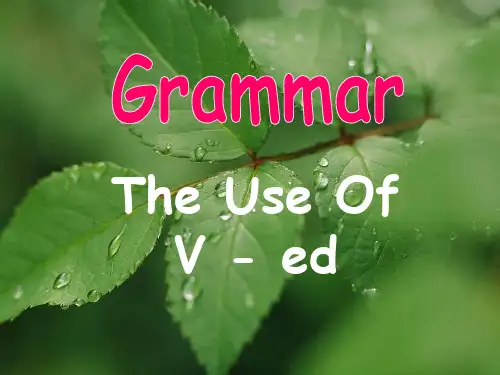
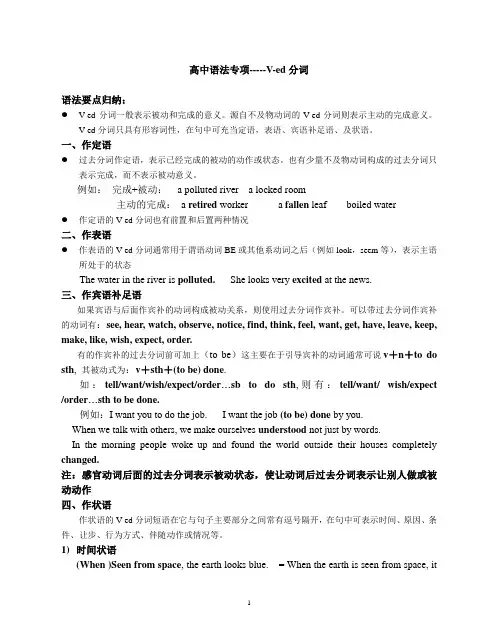
高中语法专项-----V-ed分词语法要点归纳:●V-ed分词一般表示被动和完成的意义。
源自不及物动词的V-ed分词则表示主动的完成意义。
V-ed分词只具有形容词性,在句中可充当定语,表语、宾语补足语、及状语。
一、作定语●过去分词作定语,表示已经完成的被动的动作或状态。
也有少量不及物动词构成的过去分词只表示完成,而不表示被动意义。
例如:完成+被动: a polluted river a locked room主动的完成:a retired worker a fallen leaf boiled water●作定语的V-ed分词也有前置和后置两种情况二、作表语●作表语的V-ed分词通常用于谓语动词BE或其他系动词之后(例如look,seem等),表示主语所处于的状态The water in the river is polluted. She looks very excited at the news.三、作宾语补足语如果宾语与后面作宾补的动词构成被动关系,则使用过去分词作宾补。
可以带过去分词作宾补的动词有:see, hear, watch, observe, notice, find, think, feel, want, get, have, leave, keep, make, like, wish, expect, order.有的作宾补的过去分词前可加上(to be)这主要在于引导宾补的动词通常可说v+n+to do sth, 其被动式为:v+sth+(to be) done.如:tell/want/wish/expect/order…sb to do sth,则有:tell/want/ wish/expect /order…sth to be done.例如:I want you to do the job. I want the job (to be) done by you.When we talk with others, we make ourselves understood not just by words.In the morning people woke up and found the world outside their houses completely changed.注:感官动词后面的过去分词表示被动状态,使让动词后过去分词表示让别人做或被动动作四、作状语作状语的V-ed分词短语在它与句子主要部分之间常有逗号隔开,在句中可表示时间、原因、条件、让步、行为方式、伴随动作或情况等。

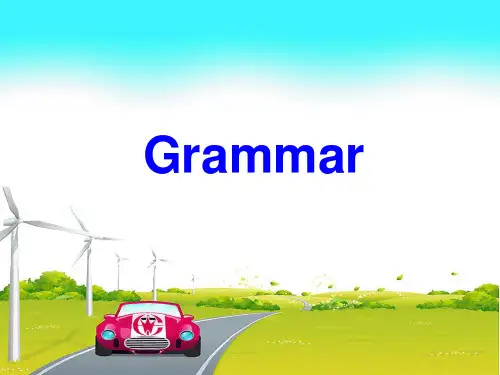
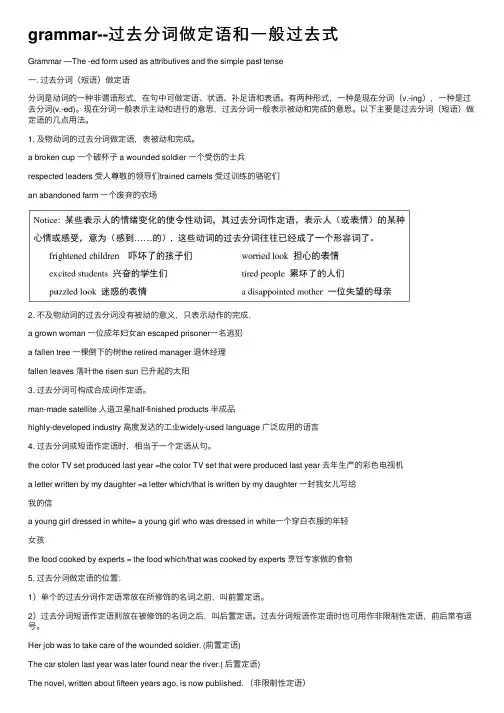
grammar--过去分词做定语和⼀般过去式Grammar —The -ed form used as attributives and the simple past tense⼀. 过去分词(短语)做定语分词是动词的⼀种⾮谓语形式,在句中可做定语、状语、补⾜语和表语。
有两种形式,⼀种是现在分词(v.-ing),⼀种是过去分词(v.-ed)。
现在分词⼀般表⽰主动和进⾏的意思,过去分词⼀般表⽰被动和完成的意思。
以下主要是过去分词(短语)做定语的⼏点⽤法。
1. 及物动词的过去分词做定语,表被动和完成。
a broken cup ⼀个破杯⼦ a wounded soldier ⼀个受伤的⼠兵respected leaders 受⼈尊敬的领导们trained camels 受过训练的骆驼们an abandoned farm ⼀个废弃的农场2. 不及物动词的过去分词没有被动的意义,只表⽰动作的完成.a grown woman ⼀位成年妇⼥an escaped prisoner⼀名逃犯a fallen tree ⼀棵倒下的树the retired manager 退休经理fallen leaves 落叶the risen sun 已升起的太阳3. 过去分词可构成合成词作定语。
man-made satellite ⼈造卫星half-finished products 半成品highly-developed industry ⾼度发达的⼯业widely-used language ⼴泛应⽤的语⾔4. 过去分词或短语作定语时,相当于⼀个定语从句。
the color TV set produced last year =the color TV set that were produced last year 去年⽣产的彩⾊电视机a letter written by my daughter =a letter which/that is written by my daughter ⼀封我⼥⼉写给我的信a young girl dressed in white= a young girl who was dressed in white⼀个穿⽩⾐服的年轻⼥孩the food cooked by experts = the food which/that was cooked by experts 烹饪专家做的⾷物5. 过去分词做定语的位置:1)单个的过去分词作定语常放在所修饰的名词之前,叫前置定语。
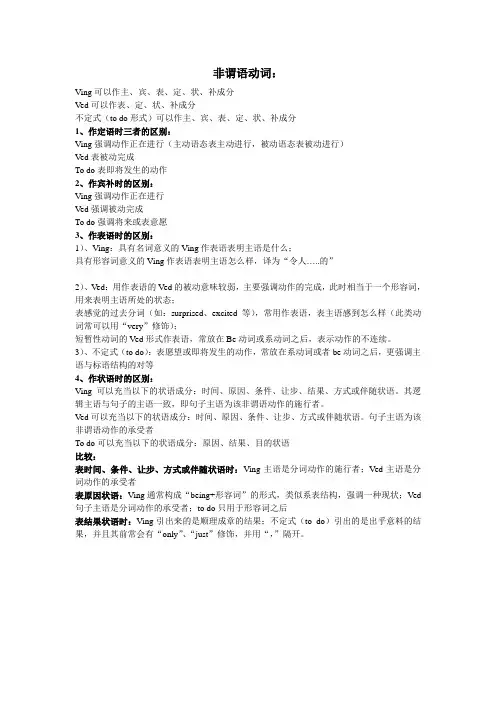
非谓语动词:Ving可以作主、宾、表、定、状、补成分Ved可以作表、定、状、补成分不定式(to do形式)可以作主、宾、表、定、状、补成分1、作定语时三者的区别:Ving强调动作正在进行(主动语态表主动进行,被动语态表被动进行)Ved表被动完成To do表即将发生的动作2、作宾补时的区别:Ving强调动作正在进行Ved强调被动完成To do强调将来或表意愿3、作表语时的区别:1)、Ving:具有名词意义的Ving作表语表明主语是什么;具有形容词意义的Ving作表语表明主语怎么样,译为“令人…..的”2)、Ved:用作表语的Ved的被动意味较弱,主要强调动作的完成,此时相当于一个形容词,用来表明主语所处的状态;表感觉的过去分词(如:surprised、excited等),常用作表语,表主语感到怎么样(此类动词常可以用“very”修饰);短暂性动词的Ved形式作表语,常放在Be动词或系动词之后,表示动作的不连续。
3)、不定式(to do):表愿望或即将发生的动作,常放在系动词或者be动词之后,更强调主语与标语结构的对等4、作状语时的区别:Ving可以充当以下的状语成分:时间、原因、条件、让步、结果、方式或伴随状语。
其逻辑主语与句子的主语一致,即句子主语为该非谓语动作的施行者。
Ved可以充当以下的状语成分:时间、原因、条件、让步、方式或伴随状语。
句子主语为该非谓语动作的承受者To do可以充当以下的状语成分:原因、结果、目的状语比较:表时间、条件、让步、方式或伴随状语时:Ving-主语是分词动作的施行者;Ved-主语是分词动作的承受者表原因状语:Ving通常构成“being+形容词”的形式,类似系表结构,强调一种现状;Ved 句子主语是分词动作的承受者;to do只用于形容词之后表结果状语时:Ving引出来的是顺理成章的结果;不定式(to do)引出的是出乎意料的结果,并且其前常会有“only”、“just”修饰,并用“,”隔开。
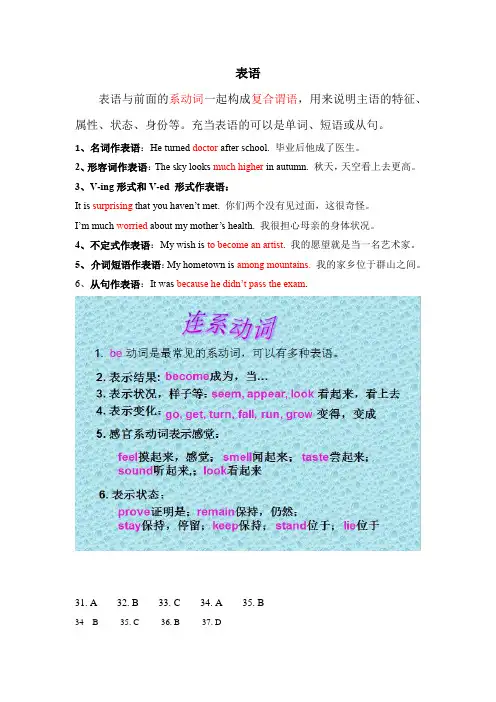
表语表语与前面的系动词一起构成复合谓语,用来说明主语的特征、属性、状态、身份等。
充当表语的可以是单词、短语或从句。
1、名词作表语:He turned doctor after school. 毕业后他成了医生。
2、形容词作表语:The sky looks much higher in autumn. 秋天,天空看上去更高。
3、V-ing形式和V-ed 形式作表语:It is surprising that you haven’t met. 你们两个没有见过面,这很奇怪。
I’m much worried about my mother’s health. 我很担心母亲的身体状况。
4、不定式作表语:My wish is to become an artist. 我的愿望就是当一名艺术家。
5、介词短语作表语:My hometown is among mountains.我的家乡位于群山之间。
6、从句作表语:It was because he didn’t pass the exam.31. A 32. B 33. C 34. A 35. B34 B 35. C 36. B 37. D宾语补足语有些动词除了需要宾语外,还需要有宾语补足语,这样句子的意义才能完整。
宾语和宾语补足语在逻辑上有主谓关系,这是判断宾语补足语的主要依据。
含有宾语补足语的句子变为被动句时,宾语补足语便成了主语补足语。
名词、形容词、副词、介词短语、V-ing形式和V-ed形式、不定式等皆可作宾语补足语。
We all find him funny.我们都认为他很滑稽。
Will you please invite all of them in? 你能不能把他们都邀请进来?He was once again founded wandering along the city street.有人再次发现他在城市街头流浪。
We find him reading the book. 我们发现他正在读书。
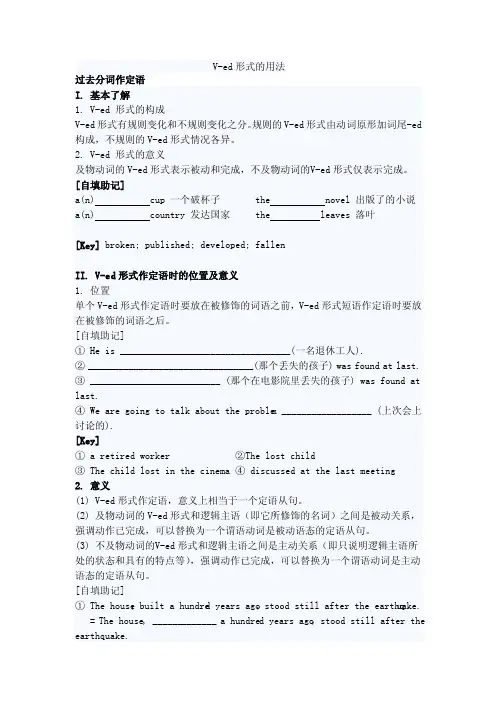
V-ed形式的用法过去分词作定语I. 基本了解1. V-ed 形式的构成V-ed形式有规则变化和不规则变化之分。
规则的V-ed形式由动词原形加词尾-ed 构成,不规则的V-ed形式情况各异。
2. V-ed 形式的意义及物动词的V-ed形式表示被动和完成,不及物动词的V-ed形式仅表示完成。
[自填助记]a(n) cup 一个破杯子 the novel 出版了的小说a(n) country发达国家 the leaves落叶[Key] broken; publish ed; develop ed; fallenII. V-ed形式作定语时的位置及意义1. 位置单个V-ed形式作定语时要放在被修饰的词语之前,V-ed形式短语作定语时要放在被修饰的词语之后。
[自填助记]① He is __________________________________(一名退休工人).② _________________________________(那个丢失的孩子) was found at last.③ __________________________ (那个在电影院里丢失的孩子) was found at last.④ We are going to talk about the problem __________________(上次会上讨论的).[Key]① a retired worker②The lost child③ The child lost in the cinema④ discuss ed at the last meeting2. 意义(1) V-ed形式作定语,意义上相当于一个定语从句。
(2) 及物动词的V-ed形式和逻辑主语(即它所修饰的名词)之间是被动关系,强调动作已完成,可以替换为一个谓语动词是被动语态的定语从句。
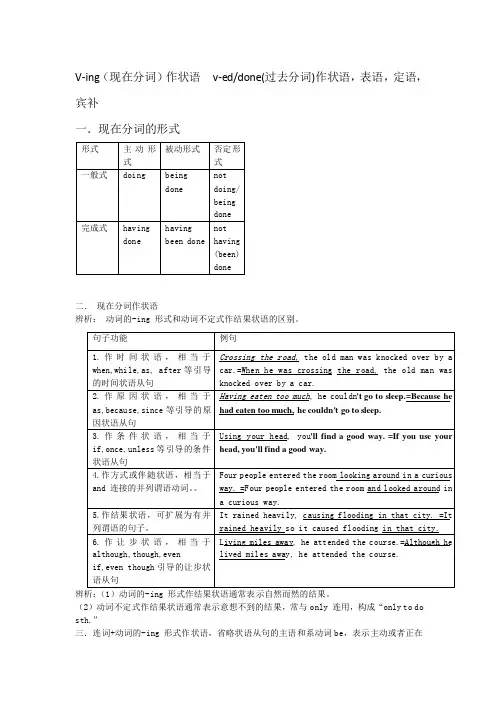
V-ing (现在分词)作状语v-ed/done(过去分词)作状语,表语,定语,宾补一.现在分词的形式形式主动形式被动形式否定形式一般式doing beingdone not doing/beingdone完成式havingdone having been done not having(been)done二.现在分词作状语辨析:动词的-ing 形式和动词不定式作结果状语的区别。
辨析:(1)动词的-ing 形式作结果状语通常表示自然而然的结果。
(2)动词不定式作结果状语通常表示意想不到的结果,常与only 连用,构成“only to do sth.”三.连词+动词的-ing 形式作状语,省略状语从句的主语和系动词be ,表示主动或者正在句子功能例句1.作时间状语,相当于when,while,as,after 等引导的时间状语从句Crossing the road,the old man was knocked over by a car.=When he was crossing the road,the old man was knocked over by a car.2.作原因状语,相当于as,because,since 等引导的原因状语从句Having eaten too much ,he couldn 't go to sleep.=Because he had eaten too much,he couldn't go to sleep.3.作条件状语,相当于if,once,unless 等引导的条件状语从句Using your head,you 'll find a good way.=If you use your head,you'll find a good way.4.作方式或伴随状语,相当于and 连接的并列谓语动词。
Four people entered the room looking around in a curious way.=Four people entered the room and looked around in a curious way.5.作结果状语,可扩展为有并列谓语的句子。
高三一轮语法回顾与训练---非谓语动词一、非谓语动词的定义非谓语动词是指在句子中不是谓语的动词,主要包括不定式to do、v.-ing和v.-ed。
二、非谓语动词的功能:在句中充当除谓语之外的其他成分(主语、宾语、表语、定语、状语等)。
注意: 过去分词done 不能充当主语和宾语;having (been) done不能作主语或定语。
三、非谓语动词的含义:1. to do 表“为了做”、“结果(常指意料外的结果)”时,常做目的状语和结果状语;表“要去”、“将要”时,常做定语或表语等。
2. doing 带有“主动”或“正在/ 一直进行中”的含义;表情绪的v.-ing常表“令人感到…”的含义。
3. done 带有“被动”或“已经完成”的含义;表情绪的v.-ed常表“感到…”的含义。
考点归纳一、不定式to do与v.-ing作主语除固定句型外,v.-ing作主语和不定式to do作主语无重大区别,只是侧重点有所不同。
v.-ing 常表示泛指的、一般的行为;不定式to do常表示某次具体的行为或将来的动作。
Sometimes shopping from one location to another makes you wait in line.(泛指一般的、通常的行为)It took years of work to reduce the industrial pollution and clean the water. (特指一次具体行为)常考固定句型:(1)It’s no use / good / fun / pleasure doing sth.It’s no use complaining that you don’t have an opportunity to land an ideal job.(2)It’s +adj. + (for / of sb.) + to do sth.能搭配of或者for的形容词有哪些?归纳如下,请牢记!It’s kind / brave / polite / careless / honest / clever of you to do…=You are kind / brave / polite / careless / honest / clever to do…It’s important / difficult / necessary / easy for you to do…(不能说You are important / difficult /necessary / easy to do…)It’s brave of you to rescue the child from the burning house.It’s difficult for me to handle the problem.二、不定式to do与v.-ing作宾语1. 常接不定式作宾语的动词,即afford / agree…to do sth,(请重点记忆):afford, agree, aim, bother, decide, determine, expect, fail, hope, intend, manage, offer, pretend, refuse, threatenI cannot afford to pay such a price.We decided not to go out because of the weather.2. 常接v.-ing作宾语的动词(短语),即admit / advise…doing sth,请重点记忆:admit, advise, appreciate, avoid, delay, enjoy, escape, finish, imagine, mind, miss, practice / practise, quit, risk, resist, stand, suggest, tolerate, feel like, cannot help / resist, be busy, be worth…They couldn’t help / resist laughing when they heard the joke. 他们听到这个笑话不禁大笑起来。
V-ed和V-ing形式的用法对比一、作表语:主语+系动词+表语(系动词有be, look, turn, get, become, smell, taste, seem, sound, appear, remain, feel)看主语是人或物V-ed人: I am bored.V-ing物:The film is boring.※“be+V-ed”也可能是被动语态:They were trapped.(状态)They were trapped by the flood.(动作)二、作定语:单个分词+名词/代词;名词/代词+分词短语(分词短语作定语可转换为相应定语从句)看与所修饰词的关系:V-ed被动、完成:guests(who were)invited to the party; a developed country V-ing主动、进行:the girl (who is) dancing there; a developing country※a reading room—a room for reading(V-ing表用途)三、作宾补:看与宾语的关系:V-ed被动、完成;V-ing主动、进行1、感官动词(see, watch, notice, observe, hear, feel, listen to, find)+宾语+宾补eg.①I saw a man knocked down by a car just now.②I hear a girl singing in the next room.2、使役动词(have, make, get, keep, leave)+宾语+宾补eg.①Have you got your films developed?②I’m sorry to keep you waiting so long.※”make oneself+V-ed(understood, heard, noticed, known)”表结果含义eg. He raised his voice in order to make himself heard by all the people at the meeting.※“have+sth+done”表示:主语请人或让人做某事/主语遭遇不愉快、不测的事/使某事被做3、表示“希望、要求”的动词(want, wish, like, expect, order)+宾语+宾补也可在V-ed前加to beeg. The boss wouldn’t like the problem (to be) discussed.4、“with+宾语+宾补”在句中表示时间、原因、方式、条件等状语eg. With the matter settled, we all went home.四、作状语:可表示时间、原因、方式、条件、让步、伴随等,可转换为相应状语从句。
⾼中语法⾮谓语形式V+edandV+ing在句中做定语和表语随堂练习Grammar ⾮谓语形式V+ed and V+ingI.V+ed or V+ing is used as attributes and predicates1.作定语的V+ed or V+ing 如果是⼀个单词,⼀般放在所修饰的名词前⾯,如果是⼀个短语,则放在所修饰的名词之后,相当与⼀个定语从句。
如:a sleeping baby a baby sleeping in bed / a broken cup a cup brought yesterday修饰⼀个名词或代词⽤v+ed or V+ing,要看它们所修饰的那些词是执⾏还是承受它们的动作,进⾏着的还是结束的动作。
执⾏或进⾏着的取v+ing ;完成或承受取v+ed。
如:falling leaves/ fallen leaves the changing/changed world the rising/risen suna guided trip a pouring rain a student standing there a student called Johnflowers growing by the lake the wheat grown in that area表⽰情感⽅⾯的词,去v+ed or v+ing, 看所修饰的那个词是令别⼈如何如何,还是⾃⼰感到如何如何。
如:an interesting film an interesting look / a good-looking girl a worried woman2.作表语的v+ed or v+ed 的选择看句⼦的主语是令⼈如何如何,还是句⼦的主语感到如何如何。
如:The news is encouraging. I was encouraged when I heard the news.The joke was amusing . I was amused at the jokeExercises:I. Combine the two sentences, using v+ed or v+ing .1.Do you see the plane. It’s flying. Do you see the ______ plane?2.Yesterday we went to see a film. It was exciting. Yesterday we went to see an _____ film.3.The temperature of the boiling water is 100 C. The temperature of the ____ water is 100C.4.She put the baby on the bed. It was sleeping. She put the _________ baby on the bed.5.Yo u can’t catch the bird. The bird is flying. You can’t catch the _________ bird.6.I couldn’t find the page. It was missing. I couldn’t find the ________page.7.We talked a lot about the festival. It was coming. We talked a lot about the _____ festival.8.The baby is hungry. It is lying in bed. The baby ____________ is hungry.9.The man is our team leader. He is shaking hands with the foreign visitors.The man ___________hands with the foreign visitors is our team leader.11. Do you know the man? He is standing by the window.Do you know the man __________ by the window?12.You may ask the woman. She is dressed in white.You may asked the woman __________ in white.13.Tell the boys not to make so much noise. They are playing there.Tell the boys _____________ not to make so much noise.14.The window is broken. The window faces south. The window __________ south is broken.15.There is a road before us. It leads to the People’s Park.There is a road before us _______________ the People’s Park.16.The pictures are wonderful. They were taken by Xiao Li.The pictures _______ by Xiao Li are wonderful.17.This is a short story. It was written by Lu Xun.This is a short story _________ by Lu Xun. 18.She returned the wallet. It was found by the roadside. She returned the wallet _______ by the roadside.19.The plants are well looked after. They once grew in the forest.The plants once _________ in the forest are well looked after.20.I like that teacher. She is always wearing a big smile.I like that teacher always __________ a big smile.21.The computers are made of that company. They are of good quality.The computers _______ of that company are of good quality.22.He told me his plane . It sounds practical.He told me his plane ________ practical.23.Li Ming was the first who came to school.Li Ming was the first ________ to school.24.This is the stadium which is being built now. This is the stadium __________now.25.Did you attend the meeting that was held yesterday?Did you attend the meeting ________ yesterday?26.He has invited me to the party which will be held next Sunday.He has invited me to the party _____________ next Sunday.II. Change the underlined attributive clauses into v+ed or v+ing phrases:1.The building which stands over there is our new library.2.Where is the letter which was received yesterday?3.The experiment that is being done is very important.4.The experiment that was done yesterday was a great success.5.The experiment that will be done tomorrow morning is very important.6.In the year that followed, he passed the entrance examination and became a college student.7.We must keep a secret of the things that are being discussed here.8.How I regret the days which were wasted doing useless things.9.Once upon a time there were a wise man who lived in a village in India.10.The house that is made of brick is a house that looks ordinary.III. Correct the mistake in each sentence:1.What an encouraged article!2.The boy being played there is my younger brother.3.Those died will soon be sent to the hospital nearby.4.This is the new material testing in our lab.5.All ships sailed on the oceans call for help by radio in English.6.His is the first coming to school and the last leaving school.7.He let out an exciting cry when he heard the exciting news.8.We are worried to see his disappointing look on his face.9.Are you pleased with the flat having been bought last month by your father.10.The tiger said to the frightened girl in a frightened voice.IV. Choose the correct answer from the four:1.The computer center, ______ last year, is very popular among the student in this school.A. openB. openingC. having openedD. opened2.The first textbooks ____ for teaching English as foreign language came out in the 16th century. A. having written B. to be written C. being written D. written3.The Olympic Games, ____ in 776 BC, did not include women players until 1912.A.first playedB. to be first playedC. first playingD. to be first playing4.The ___ boy was last seen ___ near the East Lake.A.missing; playing B,. missing; play C. missed, played D. missed; to play5.The lady would buy a gift for her daughter with the _____ .A.20 dollars remainedB. 20dollars to remainC. remained 20 dollars D remaining 20 dollars.6.The picture _____ on the wall is painted by my nephew.A.having hungB. hangingC. hangsD. being hung7.We all agreed with the design of the bridge _____ the next year.A.builtB. being builtC. having been builtD. to be built8.The foreigners will arrive on Monday. During ___ they will visit the schools here.A.the week that followB. the week that followedC. the following weekD. the followed week9.Tigers, ____ meat-eating animals, ____ meat.A. belonged to; feed onB. belonging to; feed onC. were belonged to; feeding onD. belonging to ; feeding on10.The hotel ____ now beside the park was designed by a group of young men.A.being builtB. to be builtC. builtD. building11.____ English is as important as ____ English.A.Spoken; writtenB. Speaking ; writtenC. Spoken; writingD. Speak; write12.Mark was seen at a _____ table yesterday.A.three-legsB. three legsC. three-leggingD. three-legged13.Anyone __ to another country needs special papers.A. traveledB. travelsC. to travelD. traveling14. Among these shoes are none ____ to us.A.belongedB. to be belongedC. belongingD. belongs15.Though China is a ___________ country, English is spoken all over the country.A. Speaking-ChineseB. Chinese–speakingC. Spoken –ChineseD. Chinese-spokenV+ed or V+ing used as predicatesI. Choose the given words to fill in the brackets :1.All of us are ____ in that _______news. ( interesting; interested)2.Mr. Smith was ______ with his ___________ son. (disappointing; disappointed)3.He felt much ______ after that climbing. (tired; tiring)4.He felt _______ by the whole _______ situation. ( encouraged; encouraging)5.She looked ______ (worry),while her sister looked ________(please).6.The __________ situation made all of us _________. (worried; worrying)7.As she felt ___ with the results, a ____ smile appeared on her face. ( satisfying; satisfied )8.Many foreigners are ______ at the ________ achievement in China. (amazing; amazed) III. Choose the proper answer from the four: 1. He didn’t enjoy the party, because he felt ___.A. things were bored and dissatisfiedB. they were bored and dissatisfiedC. he was dissatisfyingly boredD. bored and dissatisfied2. The water at the beach became ___ by refuse from the factory.A. polluteB. pollutedC. pollutingD. pollution3. ---- How did you like the lectures? ---- I thought they were ____.”A. interestedB. interestC. interestingD. of interests4. This piece of music sounds ___ . A. pleasing B. please C. pleased D. pleasure5. If a story is ___. You’ll become ___ when you read it.A. exciting , excitedB. exciting , excitingC. excited, excitedD. excited, exciting6. “ Children learn very quickly.” “ Yes, when they learn about a new subject they often____.” A. become very intere sting B. very much are interestedC. become much interestedD. are interested very much7. I’ve always been terribly frightened ___ dying. A. by B. of C. from D. for8. She was frightened __ a mouse that ran into the room. A. by B. at C. about C. of IV. Exercises for the simple present tense and the present continuous tense:I. Choose the correct answer from the four:1.---Can I join the club, Dad? ---- You can when you ___ a bit older.A. getB. will get c. are getting D. will have get2.---Do you like the material? ---Yes, it _ very soft. A. is feeling B. felt C. feels D. is felt3.----_____ down the radio--- the baby’s asleep in the next room.A.TurningB. To turnC. TurnedD. Turn4.–Is this raincoat yours? ____ No, mine ____ there behind the door.A. hangsB. has hungC. is hangingD. hung5.____ it with me and I’ll see what I can do.A.When leftB. LeavingC. If you leaveD. Leave6.E-mail, as well as telephones, ___ an important part in daily communication.A. is playingB. have playedC. are playingD. play7.Books of this kind _____ well. A. sell B. sells c. are sold D. is sold8.Hundreds of jobs __ if the factory closes. A. lose B. will be lost C. are lost D. will lose9.I’ve won a holiday for two weeks to Florida. I ___ my mum.A. am takingB. have takenC. takeD. will have taken10.Rain forests ___ are burned at such a speed that they will disappear from the earth in thenear future. A. cut B. are cut C. are being cut D. had bee n cut11. She ___ special clothes just because she likes to be different.A. has always wornB. is always wearingC. would always wearD. will always wear12.Listening to the two girls by the window. What language ____ ?A. did they speakB. were they speakingC. are they speakingD. have they been speaking13. Nowadays, a large number of women, especially those from the countryside, ____ in the clothing industry. A. is workingB. worksC. workD. worked14. As soon as he comes back, I’ll tell him when ____ and see him,A. you will comeB. will you comeC. you comeD. do you come。